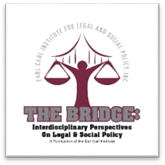 THE BRIDGE: Interdisciplinary Perspectives on Legal & Social Policy Journal ~ A Publication of the Earl Carl Institute, is an open-access peer reviewed journal that seeks to make available research and knowledge, in the areas of legal and social policy, to equip and empower educators and others nationwide with research-driven articles that contribute to their ability to meet the diverse needs of urban populations. Launched in spring 2011, a primary goal of The Bridge is to further Texas Southern University's efforts to meet its charge to solve urban problems. Since its establishment, The Bridge has served as a unique repository of interdisciplinary articles that focus solely on legal and social policy issues that impact urban and minority communities. The Bridge's current collection of published articles represents works in 27 disciplines.
THE BRIDGE: Interdisciplinary Perspectives on Legal & Social Policy Journal ~ A Publication of the Earl Carl Institute, is an open-access peer reviewed journal that seeks to make available research and knowledge, in the areas of legal and social policy, to equip and empower educators and others nationwide with research-driven articles that contribute to their ability to meet the diverse needs of urban populations. Launched in spring 2011, a primary goal of The Bridge is to further Texas Southern University's efforts to meet its charge to solve urban problems. Since its establishment, The Bridge has served as a unique repository of interdisciplinary articles that focus solely on legal and social policy issues that impact urban and minority communities. The Bridge's current collection of published articles represents works in 27 disciplines.
When it was first launched, the Bridge was originally entitled The ECI Interdisciplinary Journal for Legal & Social Policy (IJLSP). However, in fall 2014 the Editorial Board of the Journal convened for its annual planning session, and it decided to re-launch the journal with a refined vision and a new name, even more reflective of the Journal's intent to facilitate conversations involving multiple disciplines that advance social policy through academic research. Hence, The Bridge: Interdisciplinary Perspectives on Legal & Social Policy, A Publication of the Earl Carl Institute.
Why “The Bridge”?
The metaphor of bridge building is commonly used in interdisciplinary thinking and work. Often symbolizing progress, connections, and stability, it is useful in assisting academics and scholars to illustrate the interdisciplinary process-the process by which knowledge integration transpires for the purpose of an enlarged understanding. Similarly, the use of “The Bridge” in the IJLSP’s new name is meant to be symbolic of the Journal’s refined mission and goal to bridge the disciplines of law and social sciences to address disproportionality in communities of color. This is not a novel approach to creating change in our society. The Supreme Court has relied on the social sciences to reach many landmark decisions that have substantially changed societal norms. In Brown v. Board of Education of Topeka, 347 U.S. 483 (1954), which overturned the “separate but equal” doctrine established in Plessy v. Ferguson, 163 U.S. 537 (1986), the Court listed seven studies that supported its conclusion. Similarly, in Lawrence v. Texas, 539 U.S. 558 (2003) the Court overruled Bowers v. Hardwick, 478 U.S. 186 (1986), a case in which the right to privacy did not extend to private, consensual homosexual acts. The Court based its decision on the extrajudicial research presented in the amicus curiae briefs of the ACLU, the CATO Institute and an alliance of history professors. The advent of the science of DNA testing likewise has resulted in changes in legal policy as exonerations are reviewed to find the underlying causes for wrongful convictions. More recently, in the Supreme Court’s landmark decision declaring same-sex marriage a constitutional right nationwide, in Obergefell v. Hodges, 135 S.Ct. 1039 (2015) the Court referenced “countless studies, papers, books, and other popular and scholarly writings” supporting the evolution of societal change. Justice Kennedy succinctly articulated the Court’s recognition that social issues do shape our laws when he stated that marriage was the “keystone of our social order.” Indeed, nearly all landmark court decisions resulting in significant societal changes have involved evolving sciences.
![]()